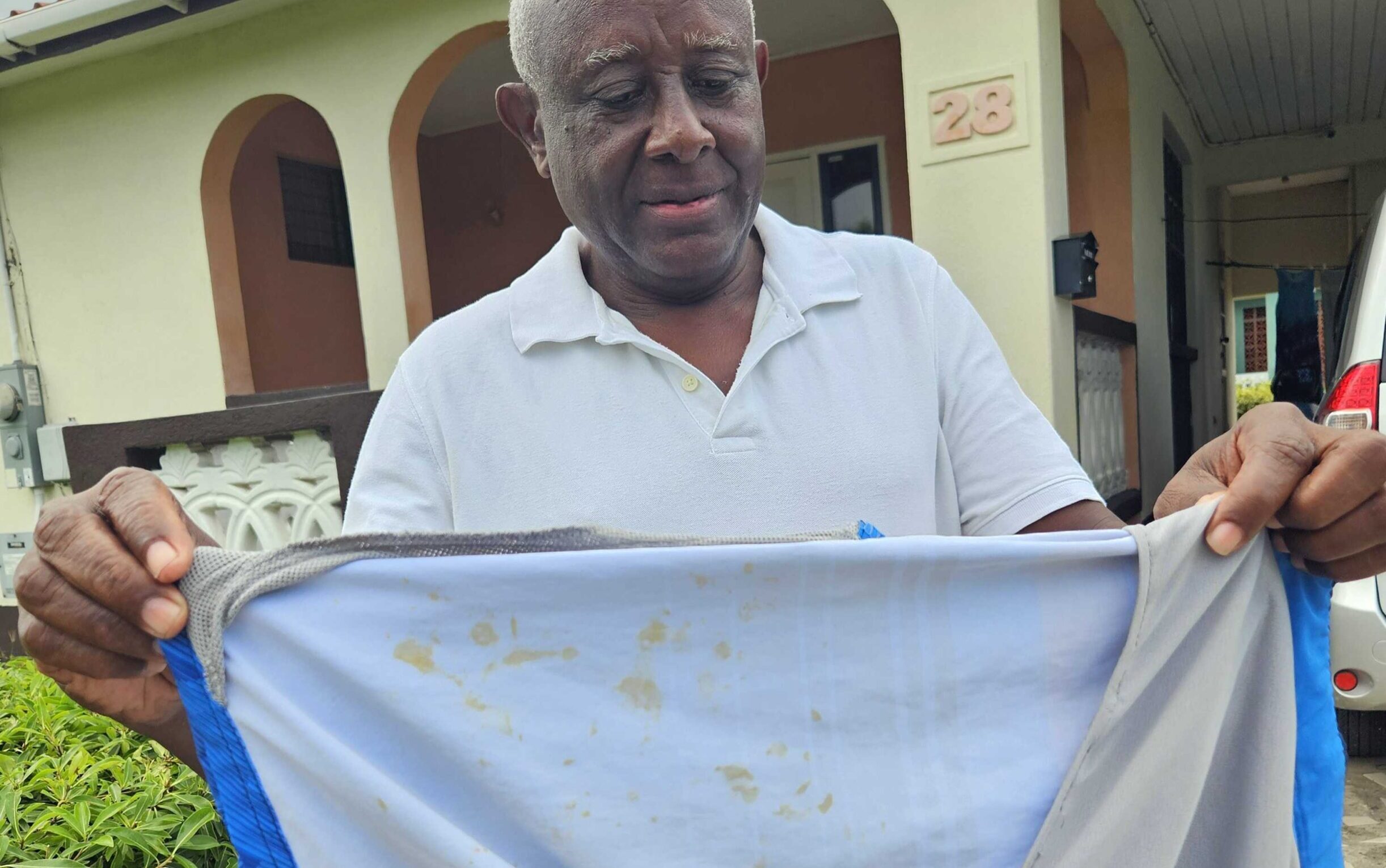Terrence Clarke shows a pair of swimming trunks stained by the brown water. (Photo by Sheria Brathwaite)
Residents in St Lucy are calling for a reduction in their water bills or a complete waiver, as they continue to experience worsening water quality.
Discoloured water, which has plagued the parish for weeks, leading to a rare boil water advisory, has led to public outcry, with many questioning why they should pay regular rates for substandard water.
Residents across the northern parish told Barbados TODAY of their frustration with the Barbados Water Authority (BWA) and the Ministry of Health, particularly after the recent advisory to boil tap water. The BWA said in an advisory on Wednesday that routine post-flood testing in various parts of the parish has shown an increased presence of brown water.
You Might Be Interested In
The water utility noted that it has been involved in a vigorous programme of mains replacement in the parish and is fully aware of the probability of infiltration of flood water into the distribution system.
It has responded to the problem by increasing chlorination, but residents argue that the water quality remains unacceptable. Many are calling for relief, with some stating that decades of poor water service have reached unbearable levels in recent weeks.
Sheryl Smith, a resident of Coles Cave, said: “That sewage tax should be off ever since and the water rate itself should be reduced. It’s not fair to people. I came to Barbados in 1974, I was born in England, and the water we have now is far way worse. The water at that time was excellent. What is happening? What is the reason why we are not progressing?”
Smith noted that the water irritated her skin, forcing her household to buy bottled water at a significant cost. She explained that her family buys two cases of bottled water weekly at $37 per case, using the water primarily for consumption, while relying on water truck deliveries for other uses.
She said her family is forced to wear mostly dark clothing as the water stains lighter garments: “It stains the clothes no matter how much baking soda or [stain remover] you use, the stains do not come out.”
Other residents echoed Smith’s concerns. At a village shop, Crab Hill resident Haw Haw Graham argued that water bills should reflect the poor quality of service.
“We shouldn’t be paying for nothing. If you pay for a service, you should be paying for quality. And too much chlorine is not good, it can poison you. That is why we have to boil it.” Graham said.
Fellow bar patron David Slocombe, who lives in Archers Bay, criticised the BWA for leaving unfinished pipework in the community for over a year. “Waterworks men come down here and start working, leave down here, which has bad water, and gone somewhere else. They came from early last year and left about a month now,” he said.
Slocombe lamented that residents are still being charged despite the ongoing issues, including paying a sewage tax without having a sewage system in place.
“The only sewage we have is the water we’re drinking,” he quipped before expressing doubts about whether connecting to the new lines would improve the situation.
Slocombe also pointed to poor road conditions exacerbated by the unfinished work, with dust from passing vehicles creating a nuisance. He, along with other residents, questioned how much longer St Lucy would be neglected in terms of infrastructure development.
Alvin Moore, another Crab Hill resident, shared similar frustrations.
“We should not be paying for water until we get a good water supply. We should not be billed… and talk about the roads – the roads are so bad you have to buy water and car parts too,” he remarked.
In Grape Hall, resident Terrence Clarke revealed that he had been forced to install a costly water filtration system to cope with the brown water coming from his taps.
“But it comes with a cost,” he said, explaining that the filters, which turn brown quickly due to the water quality, are expensive and must be changed regularly. “[The filters] are brown, brown, when being changed and to do so is expensive. I bring them in from overseas. I spent about $1 500 for the system itself and for the filters, one filter is $172.”
Given the expense, the filtration system is only installed on indoor taps, while unfiltered water is still used for washing and gardening.
Clarke emphasised that the situation is particularly unfair to pensioners.

 2 months ago
31
2 months ago
31

 English (US) ·
English (US) ·